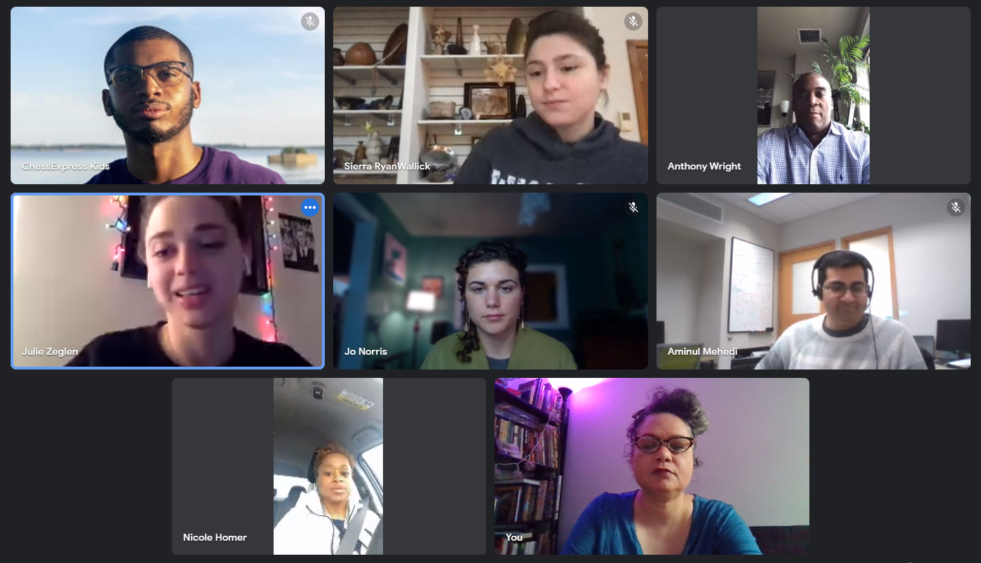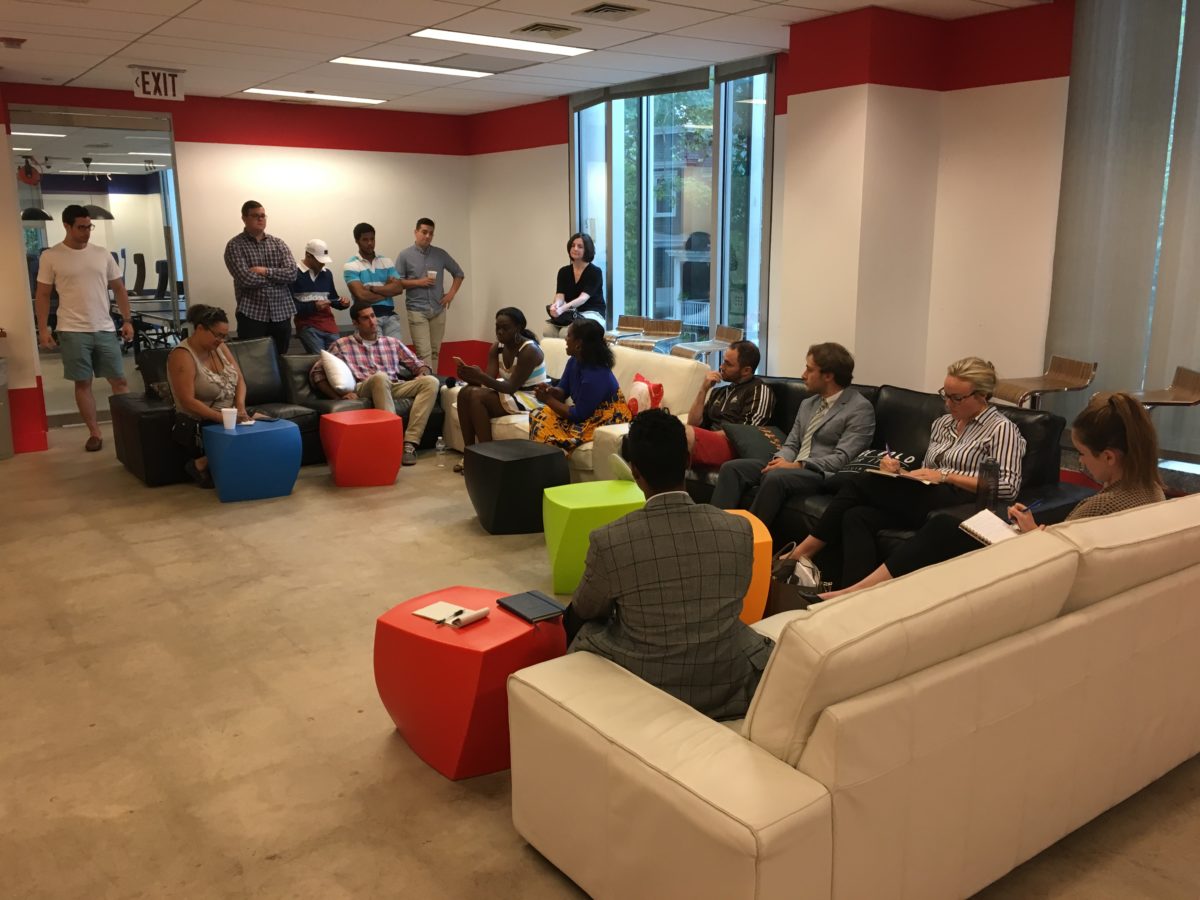Delaware founders who are happy to be here — whether they are lifelong Delawareans or recent transplants — are essential to the state’s growing startup ecosystem. And there are a lot of reasons to be happy to be in Delaware, a state small enough that young startups can be seen and celebrated.
Supporting small businesses and startups has been a focus on all levels of leadership in Delaware, with increased attention to underrepresented groups over the last couple of years, including state supported programs like Startup302 and the EDGE Grant.
Still, Delaware is not widely considered a hot place to start a business. It has the tax laws, but most Delaware corporations are located, well, pretty much everywhere else.
This month, we gathered a group of current and former Delaware RealLIST Startups for a conversation on the topic of what “local” means now.
The group included Green Line Business Group CEO Anthony Wright, Carbon Reform CEO Jo Norris, Markee CEO Craig Doig, HX Innovations cofounder Nicole Homer, CM Materials CEO Aminul Mehedi, UP Cycle Design founder Sierra RyanWallick and ChessExpress Kids founder Jayvon Fairman-Davis.
As we discussed what it’s like being a Delaware founder, some of the challenges they face came to light. There are still gaps and needs that may not be met — but the good news is, they are fixable.
Here are six things that would make it easier to be a founder in Delaware:
1. More access to venture capital funding
This one is no secret. Although the Delaware startup scene has looked to alternative ways to fund a startup, including crowdfunding, VC funding is a measure of startup ecosystem health — and Delaware doesn’t offer much local funding.
“There are almost no VCs there, almost no seed stage,” CM Materials’ Mehedi said. “I raised 95% of my money outside of Delaware through Zoom calls. I used to work in California. I saw a huge cultural difference. I think the biggest advice as a founder we can give to Delaware is to keep your entrepreneurs in state, so that in a decade, some of them become successful and they will bring in a lot of new founders, because they will be the angel investors.”
2. An eye on the future — not the past
Delaware as an old chemical industry hub can be steeped in old ways and advice, which can be especially challenging for underrepresented founders.
“Delaware has such an identity that’s tied into old chemical industry and old chemical people,” Carbon Reform’s Norris said. “I find both extremely useful, and [not]. Sometimes there are a lot of people who want to give you advice — yet not a lot of people who have actual access to the resources that I need. As a young female tech founder, they don’t want to understand the struggle sometimes. So, you kind of have to play into their world.”

Technical.ly talks with Delaware founders, February 2022. (Screenshot)
3. A more developed identity
As Delaware starts to grow out of that “old chemical industry” identity, some founders are left asking: What is Delaware’s current identity? Without one, it can be hard to attract founders (and the jobs they bring with them) as well as high-level talent.
Delaware’s identity has to be more than the tax code or the fact that such a large number of companies are incorporated here — especially since the vast majority of Delaware incorporated companies are not physically located here.
“I would like to try to establish an identity outside of that, not only for the entrepreneurial space, but just for Delaware in general, because Delaware doesn’t really have an identity,” ChessExpress Kids’ Fairman-Davis said. “I think we all have an opportunity to develop some sort of identity for the state.”
It doesn’t matter exactly what that new identity is, the founder said — though of course, he’d like for it to be chess.
4. More support for scaling startups
Delaware has some great accelerators and opportunities for young startups. But while we have seen companies like Incyte and Marlette Funding grow significantly in the last few years, this group of founders felt that more support for growing companies is needed.
“Unfortunately, Delaware does not have a community of people who can actually help a startup scale in a way that actually matters and makes an impact,” Hx Innovations’ Homer said. “Look at environments like the incubator Plug and Play out of Silicon Valley, and Austin, Texas is like this as well, where they have thought of every machine to help startups thrive, from IP strategy to commercialization strategy to how to speak with investors to help understand equity. All of these programs are specifically tailored to an entrepreneur who is literally building something from the ground up.
“You need the foundational things,” she said. “I think that Delaware needs to do a better job at giving entrepreneurs what they actually need.”
5. More effective mentor programs for businesspeople
Depending on who you talk to, access to mentors if you are an established businessperson can be challenging in Delaware.
“In Maryland, Pennsylvania and DC, I found mentor programs from very successful businessmen and women that really showed you what you needed to do next,” Green Line Business Group’s Wright said. “Baltimore had the President’s Roundtable and when I was involved in that, [members] had to be a person of color, your net worth had to be $30 million and you still had to be a sitting CEO of a company that was worth $100 million. I learned more talking to those men and women than I did in college. I find in Delaware I just can’t find that.”
6. Delawareans supporting Delaware businesses
Delaware is known for being small and somewhat insular, where everyone knows everyone, including the leaders and politicians. Delawareans like to have our own things — we were still drinking coffee from Brew Ha Ha when the rest of the world was lining up for Starbucks — but, unfortunately, that local loyalty doesn’t always hold up in other industries.
“I’m looking for people to buy Delaware,” Markee’s Doig said. “I put 50% of my marketing budget, which is $800,000, last year into Delaware. I have one Delaware customer right now [from a total of] 850 customers outside of our thousands of users. I have yet to find a company who will sit down with me and understand that my value proposition to them isn’t that we’re not necessarily the best product, but what I can say is we’re local, you can pick up the phone, I’ll sit down with you.”
His point is that he’s accessible — but local support should go both ways.

This editorial article is a part of What Local Means Now Month of Technical.ly's 2022 editorial calendar.
Before you go...
Please consider supporting Technical.ly to keep our independent journalism strong. Unlike most business-focused media outlets, we don’t have a paywall. Instead, we count on your personal and organizational support.
3 ways to support our work:- Contribute to the Journalism Fund. Charitable giving ensures our information remains free and accessible for residents to discover workforce programs and entrepreneurship pathways. This includes philanthropic grants and individual tax-deductible donations from readers like you.
- Use our Preferred Partners. Our directory of vetted providers offers high-quality recommendations for services our readers need, and each referral supports our journalism.
- Use our services. If you need entrepreneurs and tech leaders to buy your services, are seeking technologists to hire or want more professionals to know about your ecosystem, Technical.ly has the biggest and most engaged audience in the mid-Atlantic. We help companies tell their stories and answer big questions to meet and serve our community.
Join our growing Slack community
Join 5,000 tech professionals and entrepreneurs in our community Slack today!

The person charged in the UnitedHealthcare CEO shooting had a ton of tech connections

Delaware students take a field trip to China using their tablets and ChatGPT

Northern Virginia defense contractor acquires aerospace startup in $4B deal



